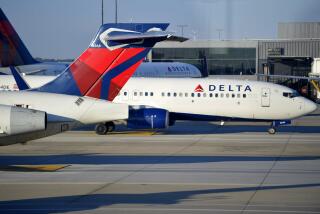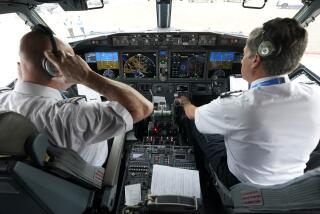Airlines Help Passengers Overcome Fear of Flying
A few weeks ago, a USAir 737 with 80 passengers aboard left the Rochester, N.Y., airport on schedule at 9:30 p.m. It was a normal takeoff. An hour later, the jet landed on schedule--at the Rochester airport.
Indeed, flight 5904 was an unusual one. The passengers shared one thing in common: Before that 60-minute journey to nowhere, they were all plane scared.
One passenger had refused to fly since 1974. Another had been so afraid of flying that he had quit his job. A third passenger was obsessed with aviation accidents. He had kept a scrapbook of every airplane mishap for the last 10 years.
One woman could only fly with a paper bag. On each flight, she became so scared that she would hyperventilate and breathe into the bag. And yet another passenger was a recovering agoraphobic. For 15 years she had not left her house.
These folks are not alone. A survey conducted by Boeing 10 years ago estimated that 25 million Americans--including one of every six adults--are afraid to fly. The survey also showed that fear of flying is twice as high among women as men and higher among blacks than whites.
Numbers Have Held Up
Ten years later, what with recent aviation accidents and more crowded skies, the numbers seem to have held up.
One vital statistic is the economic impact of the fear of flying. It has been estimated that flying phobias cost U.S. airlines about $1.6 billion a year in lost revenues.
Slowly but surely, some airlines have realized that thereâs a real economic need to alleviate those fears.
Flight 5904 was the graduation flight of USAirâs Fearful Flyers program. Since 1975 USAir has offered a special treatment program for fearful flyers that helps them conquer their problems.
For seven weeks, students participate in relaxation training and learn ways of identifying and coping with fears. There are courses in basic aviation and flying principles, familiarization with the cabin and cockpit and sessions that deal with turbulence and other flying conditions.
The $225 program also includes visits to the control tower and radar room, more relaxation exercises, and, finally, a one-hour graduation flight.
âWe get a lot of white knucklers,â says Carol Stauffer, a clinical social worker and one of the USAir instructors. âThey are usually the men in the group. They feel that it is not macho to be afraid to fly, so they fly anyway, and their knuckles are white the whole way. They do it, but they hate it.â
It is also not uncommon for a husband and wife to take the class together.
âA lot of people who are afraid to fly had a bad experience immediately before boarding an airplane,â Stauffer says. âIn the fearful flyerâs mind, the plane ends up taking on blame for trauma and, over time, the memory of that flight often ends up even more negative than the experience itself.â
Flying Lessons
Before one class, a passenger had gone as far as to take flying lessons to overcome her fear of planes. But what she found out in the class was that it wasnât necessarily the planes that scared her.
âOne of the big problems about flying phobia is the feeling that youâre not in control,â says Frank Petee, 66, a retired USAir pilot and co-director of USAirâs Fearful Flyers. Petee is also the co-author of âStop the Plane, I Want to Get Off!â
âThere are a lot of people out there who wonât get in a plane because they are not flying the plane,â Petee says. âWe try to show them that the pilot up in the cockpit is a complete professional.â
USAir claims a 97% success rate for its program.
âIt makes you feel really good when you help someone gain control over a fear to the extent that it will change their life,â says Stauffer. A recent survey of past USAir Fear of Flying class participants indicated that 95% of the graduates were still flying.
USAir holds the classes in a core group of five cities a year. The next scheduled class will be in Philadelphia Sept. 8 through Oct. 20. For more information, call (412) 486-5917.
Other airlines now offer similar programs. Delta sponsors a course in Atlanta. A retired Pan Am pilot, Capt. T. W. Cummings, has designed a program called Freedom From Fear of Flying. He has also co-authored a book by the same name. The course is available throughout the United States; call (305) 261-7042 for details.
In England, where research has shown that one out of every two people who travel by air suffers from mild apprehension to sheer panic of flying, British Airways and British Caledonian both offer special fear-of-flying programs.
British Airways sends its fearful clients to Maurice Yaffe, senior clinical psychologist at Guyâs Hospital in London and an authority on flying phobias. The two-day British Airways program costs 44 (about $70.50 U.S.) and includes a 757 flight from Heathrow Airport.
British Caledonian offers weekend courses from Gatwick Airport.
Aussie Women Teach
In Sydney, the Australian Women Pilots Assn. runs fear-of-flying courses in conjunction with Qantas.
On USAir flight 5904, the passengers slowly left their seats and walked about freely, talking among themselves and with crew members.
For the graduation flight, passengers are allowed to bring a guest. One woman brought her 9-year-old son. âHeâs starting the right way,â the mother said with a laugh. âHeâs attending a fear-of-flying class before he even knows heâs afraid.â
The usual airline rules prohibiting visits to the cockpit in flight were relaxed, and passengers were invited into the cockpit to talk with the pilots.
After the jet landed there was a small celebration party. The passengers had conquered their fears, and now many were making travel plans.
âThe flight taught me something,â one of the graduates said. âIâd hate to have had to stay in Rochester the rest of my life just because I was afraid to fly.â
âI never thought that I would get on a plane,â said the recovering agoraphobic. âIâve got two boys in school--one in Boston and the other in Hartford. Iâm ready to take my first real flight.
âBut now,â she admitted, grinning, âI have a problem. Which boy should I fly to visit first?â
More to Read
Inside the business of entertainment
The Wide Shot brings you news, analysis and insights on everything from streaming wars to production â and what it all means for the future.
You may occasionally receive promotional content from the Los Angeles Times.










